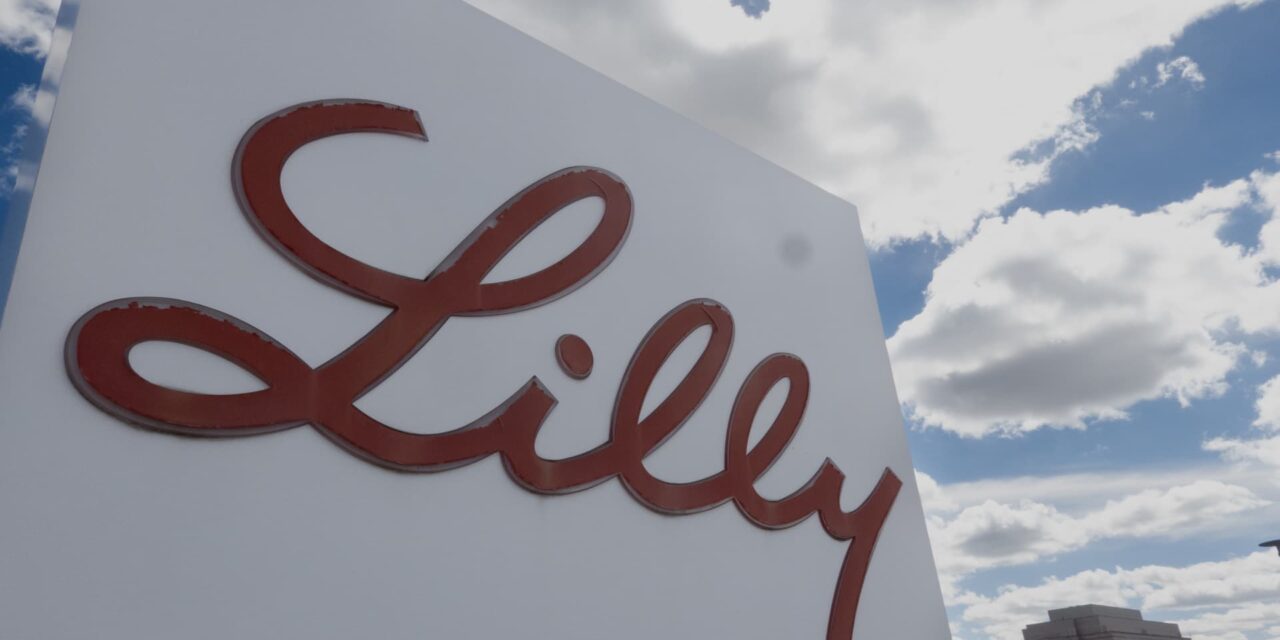
Eli Lilly Odipositas Pille Orforlipron led to a weight loss of 12%

Eli Lilly On Thursday, the highest dose of his daily obesity pill gave the patient to lose almost 12% of their body weight or about £ 27 in a late study in order to pave the way for entry into the market.
The weight loss of the pill was 11.2% in the analysis of all patients, regardless of the interruption.
The company's shares decreased by 13% on Thursday. Meanwhile shares of the rival Novo NordiskWhat also works on bringing an obesity pill onto the market rose by more than 7%on Thursday.
The data comes under the analysts of Wall Street for Eli Lillys Oraler GLP-1 with the hope of weight loss of around 15%. Some doctors said the results seem to be comparable, but overall a little lower, which is the weight loss with the weight loss observed Novo Nordisk'S blockbuster Weekly GLP-1 injection for obesity, Wegovy.
Some doctors also noticed the number of patients with the highest dose of the pill, which set up treatment due to side effects or other reasons in the study.
Nevertheless, other doctors praised the results and the potential of the pill to achieve new patients, such as those who are afraid of needles.
“This is a strong and promising result for an oral agent,” said Dr. Jaime Almandoz, medical director of the weight -wellness program at UT Southwestern Medical Center and described the weight loss “an important and clinically meaningful result”.
“Injicable have set a high bar, but this study increases the potential that an oral GLP-1 is transformative in obesity treatment, especially in patients who hesitate to start or maintain injectable therapies,” he continued.
Dr. Mihail “Misha” Zilbermint, director of the doctors of the Johns Hopkins Community, said he thinks that the pill “has the potential to be a player as long as people can tolerate the side effects”.
The study results are among the most observed studies of the year of the pharmaceutical industry and follow positive data in April from a phase -three study in which the experimental pill was examined in diabetes patients. They bring Eli Lillys Pill, Orforlipron, a step closer to potentially become a new, needle-free alternative without the dietary restrictions on the booming market for weight loss and diabetes medication, which are called GLP-1.
Eli Lilly is “not disappointed with these results. It is correct for us, even though she” “one or two points under what the street had,” CEO David Ricks told CNBCs “Squawk Box” on Thursday.
“The goal was to create an oral pill that was comfortable and can be made on a large scale for the mass market at a large level and had weight loss that was competitive with other single-effects GLP-1, and we have achieved that,” said Ricks. He added that the percentage of weight loss of the pill “in the area” of what most people want to achieve who are overweight or want to improve their health health.
Ricks said that Eli Lilly expected to submit the data to the supervisory authorities by the end of the year with the hope of starting the pill “this time next year” around the world.
This start could fundamentally change the space, more patients help access to the treatments and the relief of the supply failures of existing injections. The more convenient and lighter pill could also help Eli Lilly to consolidate his dominance in the growing segment, since other drug manufacturers, including the most important competitor Novo Nordisk, bring weight pills onto the market.
There are approximately 8 million patients with injectable obesity and diabetes medication, but probably around 170 million who could benefit from the medication, said Ken Custer, President of the Lilly Cardiometabolic Health.
“In order to satisfy this demand, we need other options, including oral small molecules such as Orforlipron, which use different means of production and do not need a demanding supply chain to distribute them to patients,” he said.
Dr. Amy Sheer, professor of medicine and program director of the specialist dealer Medicine Fellowship at the University of Florida, hopes that the pill will be cheaper than existing injections that are primarily due to the devices. You could contribute to this.
Many insurers still do not cover GLP-1 for obesity. WEGOVY and other medication have list prices of around $ 1,000 in front of the insurance company.
Detailed test results
The highest dose Eli Lillys Pille helped more than 59% of the patients to lose at least 10% of their body weight, and more than 39% of the patients lose at least 15% of their weight.
Almandoz said the proportion of people who have achieved “larger sizes” of weight loss
Orforlipron also helped reduce cardiovascular risk factors.
Data about how well some patients tolerated the pill in the study were folded under the estimates of the analysts.
About 10.3% of the patients who had the highest dose of the pill – 36 milligrams – deployed the treatment due to side effects, compared to around 2.6% of those who earned a placebo. These side effects were mainly gastrointestinal, such as nausea and vomiting and moderately to moderate. An estimated 24% of those who took the highest dose experienced vomiting, while 33.7% or 23.1% had nausea or diarrhea.
Before the data, the BMO Capital Markets Analyst Evan Seogerman said that it expected less than 10% of patients with the highest dose of the pill to cancel the treatment due to side effects and lower inheritance rates, nausea and diarrhea.
Other patients no longer have the pill on the market due to side effects compared to existing GLP-1, said Dr. Caroline Apovian, co-director of the Center for Weight Management and Wellness in the Brigham and Women's Hospital. The dismissal rates due to side effects in studies in the late stage for path effects and Eli Lilly's weekly obese injection injection zepbound are around 7% or less.
More CNBC health insurance
She found that almost a quarter of the patients with the highest dose of the pill broke off treatment for some reason, since the enthusiasm for Orforlipronem should be reduced “because we get all this excitement and then get out the pill, and then nobody can take it.”
It is unclear why these patients have broken off the pill apart from side effects. Almost 30% of those who were treated on a placebo treatment for some reason.
Eli Lillys Ricks said the company was not concerned about these dropout rates in the study.
“What we really want to see is that the medication breakdown is lower than placebo, and we saw that here,” he said, referring to the demolition rates for some reason.
Ricks added that Eli Lilly was looking for a dropout rate of less than 12% due to side effects, and found that the industry recorded 8% to 12% with GLP-1 medication.
“We are right in the middle,” he said. “The continuation rates in this category are not perfect in all categories of chronic medicines. However, the failure of the drug, and here we are back with the profile.”
The Sheer of the Florida University said that she does not believe that the discontinuation or side effects will be a decisive factor for doctors if you prescribe the pill.
She believes that an oral option could actually make more doctors more comfortable to prescribe patients an GLP-1. Some doctors are currently hesitation to prescribe injections because they “may not know how to tell the patients how they should use them,” added Sheer.
According to Almandoz, prescription decisions depend on the specific needs and preferences of the patient as well as access and affordability. An injectable GLP-1 can be the preferred option for patients whose priority has a higher level of weight loss or those with considerable cardiometabolic complications or health problems from cardiovascular diseases and metabolic disorders.
However, an oral GLP-1 could be suitable for those who “prioritize simplicity or convenience or have these logistical challenges with injections,” he said.
The detailed results of the experiment will be presented at a European medical meeting in September and published in a journal examined by experts. Further study results of phase three in the pill will be shared later this year, including a study of adults with obesity or overweight and type -2 diabetes.
Wegovy, Eli Lillys Pille, Oroflipron and Novo Nordisks Diabetes Pill Rybelsus all work by targeting an intestinal hormone called GLP-1 to promote weight loss and regulate blood sugar. But in contrast to these other medication, Eli Lillys Pille is not a peptide medication. This means that it is more easily absorbed in the body and does not require dietary restrictions such as Rybelsus.
Eli Lilly is currently about three years in front of other drug makers who develop pills, including Pfizer, Astrazeneca, Roche, Struction Therapeutics and Viking Therapeutics, Guggenheim Analyst Seamus Fernandez before CNBC.
Some analysts expect the GLP-1 market to be worth more than $ 150 billion annually in the early 2030s. According to Fernandez, oral GLP-1 could grow at a value of $ 50 billion of this total total.
– Angelica Peebles from CNBC contributed to this report.



























